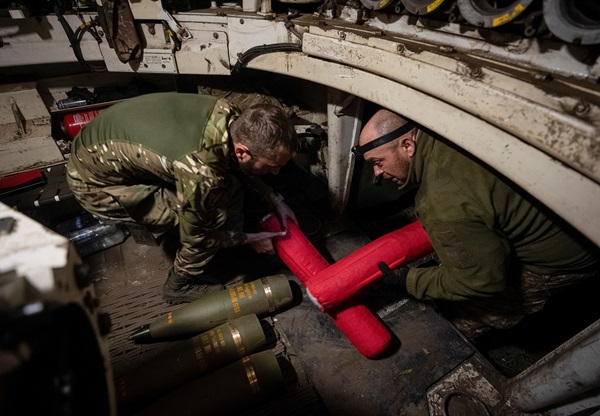 Ukrainian servicemen load shells in an M109 self-propelled howitzer before firing towards Russian troops near the town of Vovchansk, Ukraine, 20 May 2024;
Credit: Reuters/Inna Varenytsia/ File Photo
Ukrainian servicemen load shells in an M109 self-propelled howitzer before firing towards Russian troops near the town of Vovchansk, Ukraine, 20 May 2024;
Credit: Reuters/Inna Varenytsia/ File Photo
(Reuters) - On Friday 24 May 2024, President Volodymyr Zelensky said that Ukrainian forces had secured "combat control" of areas where Russian troops staged an incursion this month in northern parts of the Kharkiv region.
"Our soldiers have now managed to take combat control of the border area where the Russian occupiers entered," Zelensky said in his nightly video address.
Zelensky's comments, after holding a meeting of military and regional officials in Kharkiv, Ukraine's second-largest city, appeared to be at variance with comments by Russian officials.
Viktor Vodolatsky, a member of Russia's State Duma lower house of parliament, was quoted by Tass news agency as saying Russian forces controlled more than half the territory of the town of Vovchansk, 5 km inside the border.
Vodolatsky was quoted as saying that once Vovchansk was secured, Russian forces would target three cities in Ukraine's eastern Donetsk region - Sloviansk, Kramatorsk and Pokrovsk.
Reuters was unable to verify independently battlefield accounts from either side.
Russian forces pushed into border regions of Ukraine's Kharkiv region this month and Russia's Defence Ministry said they had secured control of about twelve settlements.
Zelensky and other Ukrainian officials had been reporting success in "stabilising" the area.
The Ukrainian military's General Staff, in its evening report on Friday, said the situation in Vovchansk was "tense but controlled by the defence forces".
"The Russian army today launched air terror against this town - eight guided bombs hit the town," it said. Attacks were launched on at least two other settlements north of Kharkiv.
A late-night report by the General Staff said Ukrainian forces had repelled ten Russian attacks in the area, including around Vovchansk.
It also noted that Russian forces had achieved "partial success" in areas near Kupiansk, further east in Kharkiv region, and the Pokrovsk sector where heavy fighting has been taking place further south in Donetsk region.
Ukrainian military bloggers said Ukrainian troops had been holding their ground around Vovchansk and Russian forces were using less infantry in the area and instead firing from a distance, with limited accuracy.








